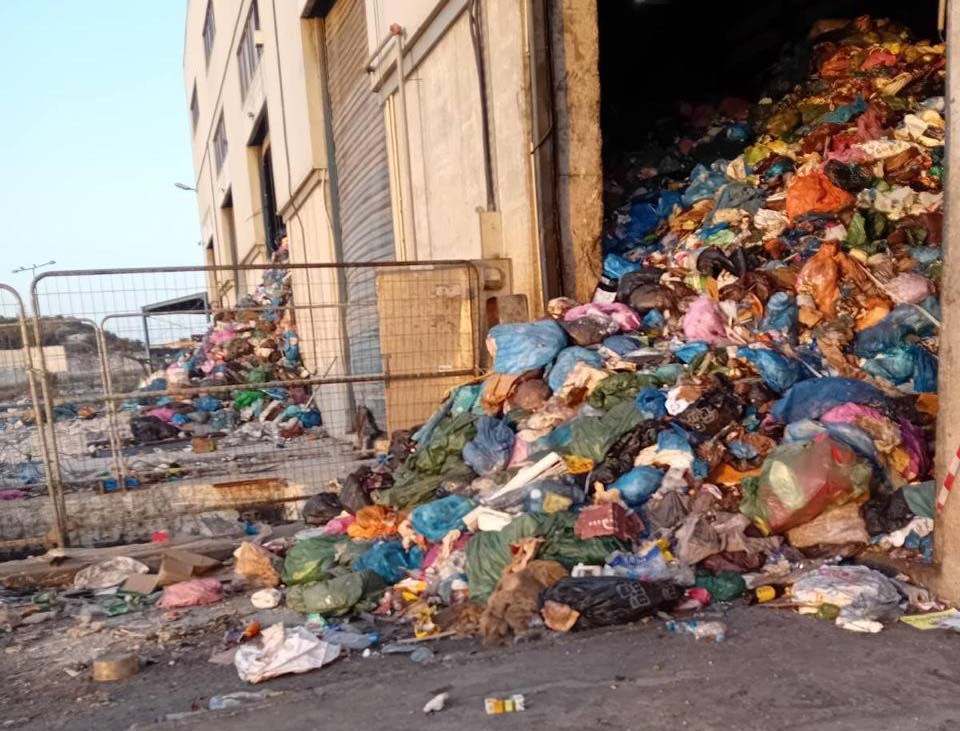‘Party over’ for disastrous Pentakomo waste plant

Years of dumping tonnes of rubbish in a waste management plant that does not have the capacity to process municipal waste from the Limassol district it was built to serve, have led to an unbearable stink and water cuts.
As far as community president Giorgos Economou is concerned, “The party is over!”
Economou told the Cyprus Mail that he was not a fan of protests and causing inconvenience to the broader public and would be pursuing a solution through legal channels, but he added he was not sure how long he could keep his community’s youth from taking things into their own hands.
Secretary general of the Cyprus Ecological Movement Efi Xanthou explained to the Cyprus Mail that an environmental disaster was in the making and that the movement would be reporting the issue to the European Union, which funded the project.
Economou explained that thousands of tonnes of untreated waste were being buried in landfills and that “the situation has worsened since the state took over.”
“The problem we have is that a plant was built that cost about €40 million and from day one it could not handle the load,” he said.
He said that although “we are in the process of finding a solution,” the situation is “still getting worse”.
Economou pointed out an oxymoron, first that “the state is calling on the people to manage their waste and then sends it to the landfill and then there is the Water Development Department (WDD) calling on people to save water and now Pentakomo is without water because most of its drinking water ends up at the plant to hose down the trucks.”
The WDD took over running Pentakomo last December.
In one week, “we had four days without water from 8am till 3pm,” he said.
“Everyone is turning a blind eye. I’ve requested meetings with the authorities. The state cannot be above the law,” he said. “Either the state will sit with us to find solutions or the situation will be out of control.”
As a solution, Economou suggests building a second plant as an extension to the current one, with new equipment that will meet the criteria.
In the meantime, he said, “the landscape is filling up with rubbish.”
“I invited the Department of Environment. They were speechless,” he added.
The plant, about 3km from Pentakomo, is causing such a stench that residents can’t keep their windows open.
Xanthou, whose movement has been campaigning to find a solution, said tonnes of water were being used to wash the trucks and then hose down the plant itself.
This, she said, was all right while the plant was treating wastewater for its own use, however now the WDD is using the drinking water earmarked for Pentakomo.
“The complaint we received was that things haven’t improved since the WDD took over. Actually, environmentally, things have deteriorated,” Xanthou explained.
She said municipal waste was being buried, the plant was not operating properly, the waste was reeking, and “people working in the area are even quitting their jobs because they can’t stand the stench.”
Xanthou referred to the dangers of dumping untreated waste, such as particles and bacteria entering the atmosphere and liquids from rotting waste oozing into the ground and trickling down to the sea instead of being dried up during treatment.
One of the obstacles to finding a solution fast was the fact that “the government cannot sue itself,” she explained.
Xanthou said if nothing came out of the movement’s efforts, they would be taking the issue to the EU for violations and infringements.
The operation of the Pentakomo plant has proved to be a fiasco. Initially the facility was supposed to generate Solid Recovered Fuel (SRF).
But the technology for the plant was changed after the contract had been awarded – in what was said to be a blatant irregularity. The mechanical biological treatment of municipal waste stipulated in the tender specs was replaced by what is known as anaerobic biological treatment.
This treatment technique could not produce SRF as the project specs had stipulated, but Refuse Derived Fuel (RDF) instead which has a high moisture content and a low calorific value that renders it a poor alternative source of fuel. With no takers for the RDF, the Pentakomo plant has been burying all the treated waste, engaging in the practice it was set up to end.
